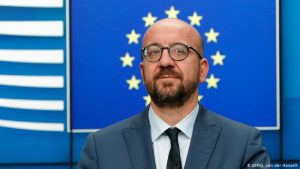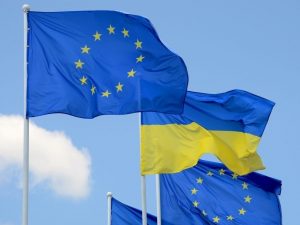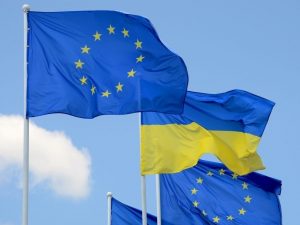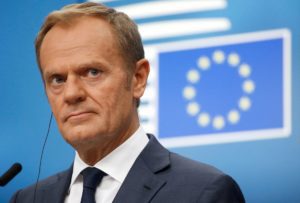
Upon arrival in Ukraine on March 2, President of the European Council Charles Michel, together with Ukrainian President Volodymyr Zelensky, will visit the east of the country and meet with representatives of the Joint Forces Operation (JFO).
“At 13:00 Kyiv time on March 2, he is to begin a meeting with President Volodymyr Zelensky; at 13:10 Kyiv time, he is to meet with representatives of the Joint Forces Operation (JFO),” the European Council said in an announcement on its website.
It is expected that on this day a meeting with representatives of the OSCE SMM and organizations that provide humanitarian assistance to Donbas may also take place. At the end of the day, Presidents Michel and Zelensky will hold a joint press conference.
The second day of the visit will take place in Kyiv on March 3 and will begin with a meeting between the European Council President and representatives of anti-corruption institutions, followed by a visit to the vaccination center. The visit will end with a meeting with President Zelensky and a joint press conference with him.
As previously reported, the President of the European Council began his visit to the countries of the Eastern Partnership on Sunday. In particular, he visited Moldova on February 28, and on March 1 he is to visit Georgia.

Prime Minister of Ukraine Denys Shmyhal says that Ukraine wants Ukrainian business to have more access to European markets, and negotiations will allow increasing the volume of trade quotas.
“We are talking about the further liberalization of trade between Ukraine and the EU. This will help increase our mutual trade and further convergence of economies … We want Ukrainian business to have more access to European markets, and hope that our negotiations will allow increasing the volume of quotas provided for our agreement with the EU,” Shmyhal said at a joint briefing with Executive Vice President of the European Commission Valdis Dombrovskis in Brussels.
Shmyhal stressed that Ukraine intends to use 2021 for solid work, the result of which should be an actual approximation to EU standards.

Some 39.3% of representatives of Ukrainian enterprises believe that their enterprises have significantly/insignificantly benefited from the Association Agreement between Ukraine and the European Union, according to a poll by the Institute for Economic Research and Policy Consulting.
According to a poll presented at an online presentation on Friday, in 2020, the largest number of enterprises assessed the impact of this document positively, since in 2018 this figure was 28%, in 2017 – 31.6%, and in 2016 – 28%.
At the same time, 50.7% of the respondents believe that the agreement did not affect their enterprise, and 5.6% believe the enterprise has lost significantly/slightly.
The lowest level of positive assessments of the impact of the agreement is among exporters. Some 22.7% of exporters indicated that the enterprise won, 62.4% that the document did not affect the enterprise, and 4.7% indicated that the enterprise lost.
Among the importers, 44.4% of the respondents believe that the enterprise won, 47.9% that the agreement did not have impact on the enterprise, and 3.8% that the enterprise lost. Some 45.1% of exporters and importers have positive expectations, 45.9% do not expect the impact of the agreement, and 4.9% expect a loss.
Big business feels more of the positive impact of the agreement. Among the representatives of large enterprises, 46.5% note that the enterprise won, 44.2% that the agreement did not have the impact on the enterprise, and 3.5% that the enterprise lost. The positive impact of the agreement is also indicated by 36.6% of the surveyed medium-sized enterprises, by 39.2% of small and by 39.4% of micro enterprises. The level of positive ratings increased among businesses of all sizes compared to 2016. The fact that the agreement did not have the impact on the enterprise is indicated by 50.9% of medium-sized, 49.5% of small and 52.7% of micro enterprises. Some 5.4% of the respondents of medium-sized enterprises said that the enterprise has lost. The same opinion is shared by 4.8% of respondents of small and 3.8% of micro enterprises.
The trade sector felt the greatest positive impact of the Ukraine-EU Association Agreement (43.2%), and the least number of positive assessments was among the agricultural enterprises (21.7%). At the same time, in the service sector, there is the highest share of respondents who point to a loss caused by the agreement (10.4%). Compared to 2016, the share of positive assessments of industrial and trade enterprises increased by almost 1.5 times, at the same time, the level of positive assessments of agricultural and service enterprises almost did not change.
The leader among the positive assessments of the impact of the agreement is Lviv region, where 55.1% of the respondents indicated that their enterprise benefited from it. Almost every second respondent gave positive assessments in Rivne (48.3%), Ternopil (48%) and Chernivtsi (47.6%) regions. The smallest number of positive assessments is in Kherson region (18.2%), where only every fifth respondent indicated a benefit from signing an agreement.
In Rivne, Ivano-Frankivsk, Volyn, Donetsk, Sumy and Vinnytsia regions, there are no respondents who felt a negative impact on their enterprise. In more than half of the regions, negative assessments of the impact of the agreement are less than 4%. And in Kherson region, there is the highest share of respondents who believe that their company has lost from the agreement (13.6%).
Some 44.9% of the respondents believe that their company will benefit from the agreement within the next five years, 24.3% that it will not have impact, and 5.6% that the company will lose.
The least positive expectations are among enterprises that are engaged only in export (34.1%). Almost every second representative of import enterprises (48.1%) or simultaneously export and import (48.6%) has positive expectations. Among the exporters, there is the highest proportion of respondents who do not expect the impact of the agreement on the company (28.2%).
The highest expectations of a positive impact of the agreement are in Cherkasy (62.5%), Lviv (60.3%), and Ternopil (60%) regions. The smallest number of enterprises that expect positive results are in Kirovohrad (30%), Zaporizhia (31.7%), and Chernihiv (34.5%) regions.
The poll was conducted in 2020 by the project “Support for the Public Initiative for Fair and Transparent Customs” with the support of the European Union, the International Renaissance Foundation and Atlas Network. More than 1,000 representatives of enterprises were surveyed from micro to large enterprises, engaged in export and/or import. Most of the respondents are micro and small enterprises, representatives of industry and trade.

The Verkhovna Rada of Ukraine has ratified amendments to Annex XXVII to the Association Agreement between Ukraine and the EU.
Some 231 people’s deputies voted for the corresponding bill at a meeting of the parliament on June 6.
AGREEMENT, ENERGY ANNEX, EU-UKRAINE, RATIFIES, UKRAINIAN PARLIAMENT

President of the European Council Donald Tusk is waiting for the Ukraine-EU summit in July 2019 and talks about this over telephone with the winner of Ukraine’s presidential elections Volodymyr Zelensky. “First, good phone call with Ukraine’s President-elect Volodymyr Zelensky. I assured him of the EU’s steadfast support to Ukraine. Looking forward to our cooperation and EU-Ukraine Summit in July,” he wrote on Twitter on Tuesday.
Tusk also said that he had a telephone conversation with incumbent President Petro Poroshenko, “after 5 years of good cooperation.”
“The competitive, free and fair presidential elections with a peaceful hand over is the best proof of Ukraine’s progress and democracy,” the European Council president noted.